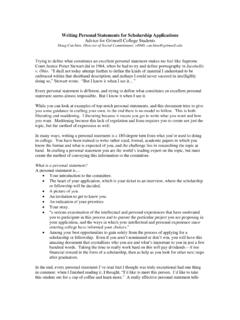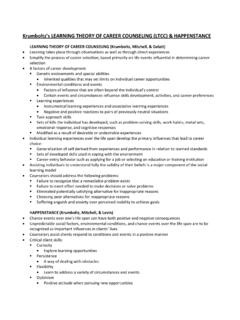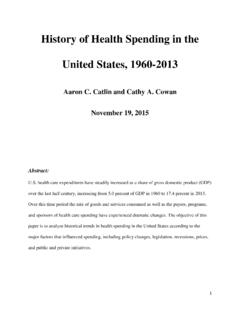Transcription of INTERNSHIP Student Handbook - Grinnell College
1 INTERNSHIP . ORIENTATION. Student Handbook A Guide for Students Participating in a Grinnell College Affiliated INTERNSHIP Experience Center for Careers, Life, and Service 1127 Park Street Grinnell , IA 50112. Phone: 641-269-4940. In case of an emergency, please contact: Grinnell College Security Office at (641) 269-4600. 4/8/14. Table of Contents Introduction ..2. INTERNSHIP Outcomes and Goals ..2. Grinnell INTERNSHIP Program INTERNSHIP Goals Rubric ..3. Strengths, Values, and Interests Assessment Wheel ..5. Common Skills Employers Seek .. 6. Strategies for Learning ..6. Developing Your Own Goals .. 7. Responsibilities of the Intern 9. Professional Workplace Expectations ..11. Reflecting During Your INTERNSHIP Experience ..12. Tips for Getting Started in Your INTERNSHIP .
2 13. Top Strategies for Making the Most of Your INTERNSHIP .. 13. Role of the INTERNSHIP Supervisor ..15. Role of the Faculty Sponsor ..16. Role of the Center for Careers, Life, and Service (CLS)..17. Risk Awareness and Management .. 17. Harassment Policy and Procedures ..18. Title IX Information and Reporting .. 20. International Internships . 21. Notice of Tax Consequences of INTERNSHIP Stipends .. 22. Budgeting Tips .. 23. INTERNSHIP Supervisor Evaluation of the Intern .. 25. Conclusion ..26. 1. Updated 4/2014. Introduction Welcome and congratulations on your upcoming INTERNSHIP ! All your hard work to secure your INTERNSHIP has paid off. You have the INTERNSHIP now what? The purpose of this Handbook is to educate, assist, inform, clarify, and prepare you for your INTERNSHIP experience.
3 This Handbook has been created by the Center for Careers, Life, and Service (CLS) to help you understand the requirements of your INTERNSHIP experience as well as support you so you can make the most of your INTERNSHIP . Some Handbook content was adapted from Marylhurst University's INTERNSHIP Program Handbook . INTERNSHIP Outcomes and Goals Internships are designed to expand the depth and breadth of academic learning for you in your particular areas of study. It is an opportunity for you to receive experience in applying theories learned in the classroom to specific experiences in the community and work world. An INTERNSHIP can also heighten your awareness of community issues, motivate you to create opportunities, embrace new ideas, and give direction to positive change.
4 A successful INTERNSHIP can give you valuable information in making decisions about the direction of future studies or employment. An INTERNSHIP is an opportunity to not only use and develop industry-related knowledge and skills, but also to enhance some of the skills that are transferable to any professional work setting. This INTERNSHIP may be your first introduction to the world of work, or maybe you have been exposed to professionalism many times before. No matter where your skills and understanding of professionalism lie, your INTERNSHIP is a chance to develop them even further. By the end of the INTERNSHIP , our hope is that you will have: Linked academic theory to practice in your discipline;. Applied your knowledge, skills, experience to a work environment.
5 Acquired new learning through challenging and meaningful activities;. Reflected on the content and process of the learning experience;. Advocated for your own learning in alignment with INTERNSHIP goals;. Demonstrated professional skills in the workplace;. Built and maintained positive professional relationships;. Demonstrated awareness of community and/or organizational issues;. Identified, clarified and/or confirmed professional direction as it relates to your academic studies and future career path;. Developed self-understanding, self-discipline, maturity and confidence;. Developed strong networking/mentoring relationships. The INTERNSHIP Program Learning Goals matrix on the following pages will assist you in understanding the three key goals and six important outcomes to provide a structure to assess your professional and personal development.
6 These are not meant to replace your our personal and professional learning goals, but instead, to provide a general framework for general professional development. 2. 3. 4. Strengths, Values, and Interest Assessment Wheel Pursuing an INTERNSHIP can assist you in developing awareness of your strengths, values, and interests which will enable you to better align your personal and professional direction. Fulfillment in a career typically happens when these three areas are found in the work you are doing. When assessing your strengths, think about what you do best, the skill of which you are most proud, or the type of tasks you find easy to perform without much effort. When assessing your values, think about what matters most to you personally and professionally.
7 Some examples are security, monetary compensation, merit, recognition, honesty, balance, or harmony. When assessing your interests, think about what you activities you enjoy pursuing, and ideas/concepts that you enjoying discussing with others without tiring, and the areas/things you would like to learn more about when you have available time. 5. Common Skills Employers Seek HARD SKILLS. As you complete your INTERNSHIP , you will be developing many skills related to a particular industry. For example, if you are in a computer science field, you may be working on projects using the C+ language. If you are in a marketing field, you may be developing your InDesign skills as you create promotional materials. If you are in a non-profit organization, maybe you may be learning all about grant writing.
8 These types of industry-specific skills are essential for a particular career field, and are often called hard skills.. SOFT SKILLS. Employers report that they are very interested in an employee showing competency in what are known as soft skills. These are skills that are not taught in a classroom. Often these skills are developed by interacting in professional work settings, involvement and leadership in Student groups, volunteers positions, and other outside the classroom experiential opportunities. Soft skills are known as transferable skills. The great thing about soft skills is that once you develop these, you can apply them to various situations for the rest of your life! For example, the soft skill of problem solving can be used in most industries from computer science to non-profit management and is, thus, referred to as transferable.
9 It is important to develop these soft skills in your INTERNSHIP . Consider incorporating the common competencies below as you create your learning goals for your INTERNSHIP . Developing these competencies will serve you well professionally and will make you more marketable in the workforce: Communication skills Team work skills Organizational skills Interpersonal skills Analytical skills Leadership skills Problem solving skills Strong work ethic Initiative Strategies for Learning The following categories represent broad types of learning goals. They illustrate the kinds of learning that can be achieved in most internships. Feel free to reference these as you are developing your goals and learning outcomes. BROADENING HORIZONS. Read available literature about your INTERNSHIP site or organization/agency.
10 Is work general or specialized? What social/economic/political functions does it serve? What issues or philosophies seem important? DEVELOPING WORK SKILLS. Learn about the chain of work involved in the particular tasks you may be doing. Where did the work come from and where is it going? How does the work you do fit into a larger picture? Why is your task necessary? What will be done with your work after it leaves you (or you leave it)? How can you use what you are learning in future jobs or in classes? CAREER EXPLORATION. Try to understand the organizational chart (formal or informal). Through what career lines do different people tend to move? What sort of education and experience is normally required in each line of work? Try to obtain knowledge of job opportunities available in your field.






